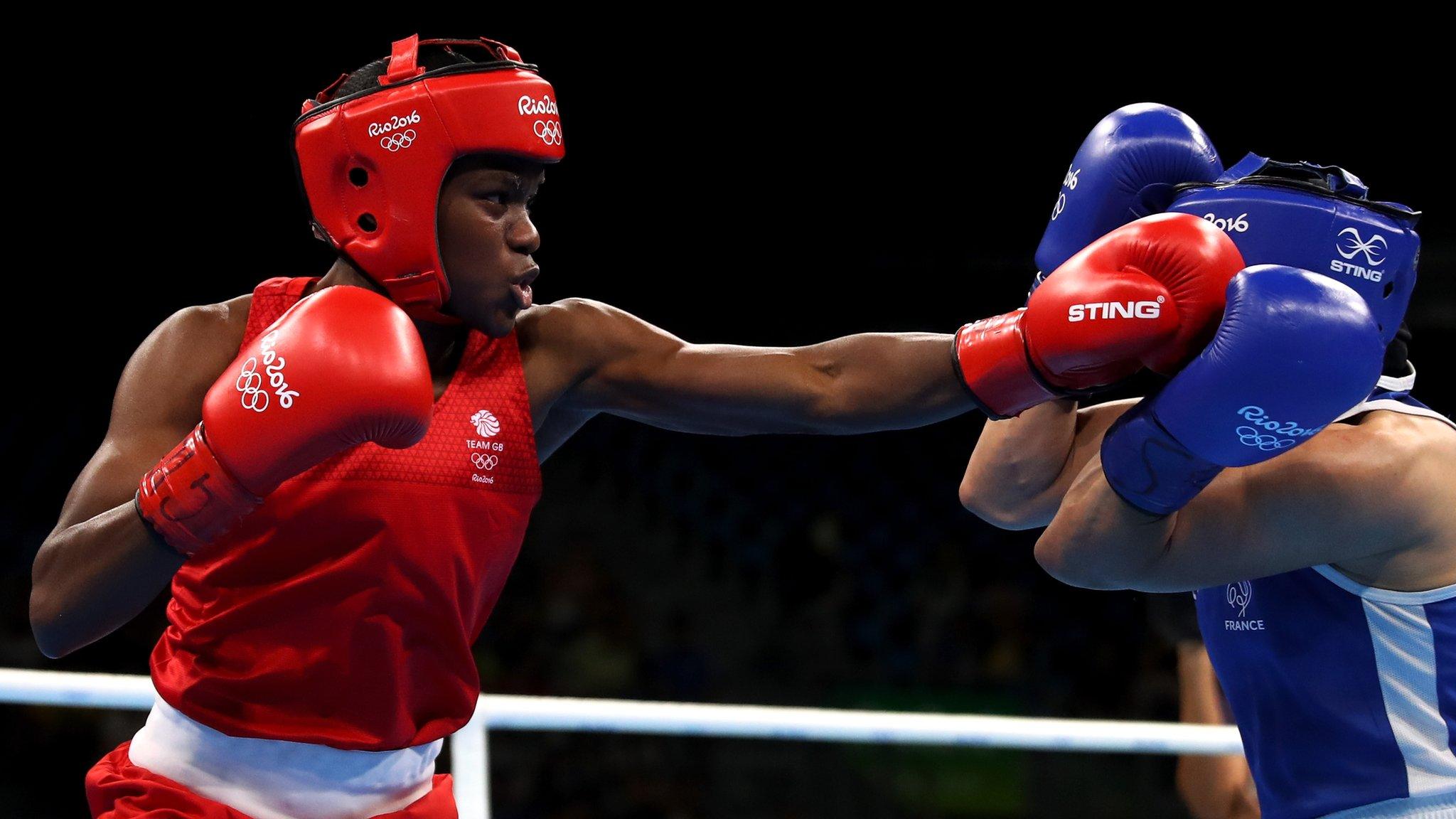Amir Khan is a changed man as he looks to upset Saul Alvarez and claim his world title
- Published
- comments
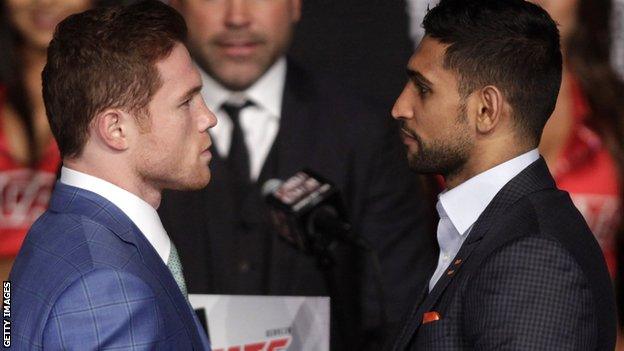
Amir Khan is stepping up two weight divisions to fight Mexico's Saul Alvarez
Like a phantom punch thrown from an unfathomable angle, it was a fight announcement that caught the boxing world cold. Even Amir Khan's trainer was caught napping. "I really didn't like the fight at all," says Virgil Hunter.
Many boxing fans viewed Khan's match against Mexican wrecking ball Saul 'Canelo' Alvarez as career suicide, akin to a Kamikaze mission: set co-ordinates for the T-Mobile Arena, approach at top speed, disintegrate on impact.
Others have dubbed it man against boy, with Alvarez - four years younger but naturally brawnier - playing the grown-up. But Khan has heard this all before. And even when he was actually a boy, he was teaching the men a lesson.
"The selectors didn't want to send me to the 2004 Olympics. They said I wasn't good enough and would get beaten up," Khan tells BBC Sport.
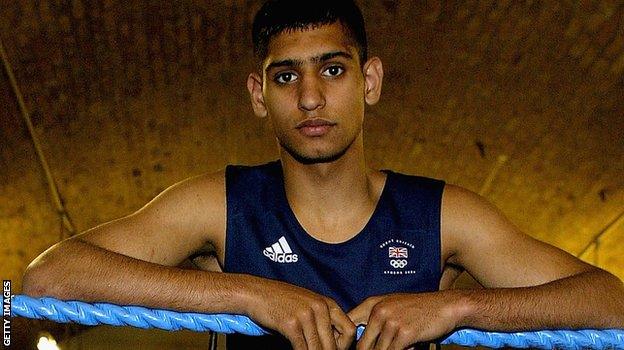
Khan fought at his only Olympic Games at the age of 17
"But I reached the final at the age of 17 and only just lost to Mario Kindelan, who was the reigning Olympic and three-time world champion. I shocked the world and I can do it again."
Khan was the only British boxer to qualify for the Athens Games, which made for some lonely moments in the Olympic village. But a silver medal dangling from your neck does wonders for your popularity, at least in the short term.
"When I returned to Britain, everyone was asking for my autograph. I'd never signed anything in my life. I just scribbled my name really fast, so it looked like I knew what I was doing. Before the Olympics I could do anything I wanted but life totally changed."
Khan thought about staying on for the 2008 Olympics but with telephone numbers being barked at him by various promoters and a family to think of, he turned over to the pro ranks instead. Inevitably, life got far more complicated.
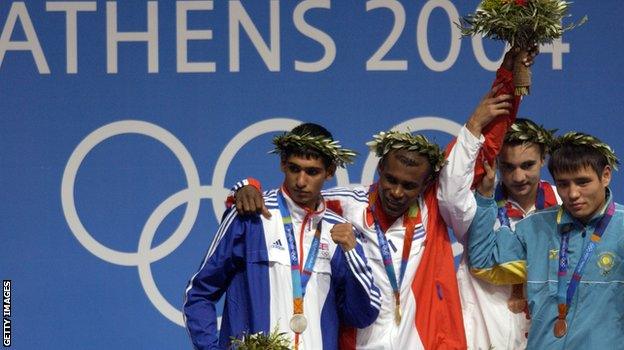
After winning a silver medal at lightweight at the 2004 Athens Games Khan's "life totally changed", he says
Khan made his pro debut a few days after the 2005 London bombings and was suddenly a reluctant mouthpiece for so-called moderate British Muslims.
"That was a difficult time. It was my dream fight but I couldn't enjoy the moment because the bombings were committed by young Muslim people. I went into the ring holding a British flag because I wanted to send a message: 'Look, we were brought up in England, we have to respect our roots.'"
A couple of years earlier, Khan had been a hyperactive kid fighting for kicks at Bury Amateur Boxing Club. Now he was a political pawn while still a teenager. Having to be so many things to so many different people, while still trying to be yourself and enjoy the fruits of your success, must be wearing in the extreme.
Three years after his debut victory over David Bailey at Bolton's Reebok Arena, which was accompanied by a welter of media articles trumpeting his cross-community appeal and unifying potential, Khan was being booed to the rafters having been knocked out in less than a minute by Breidis Prescott.
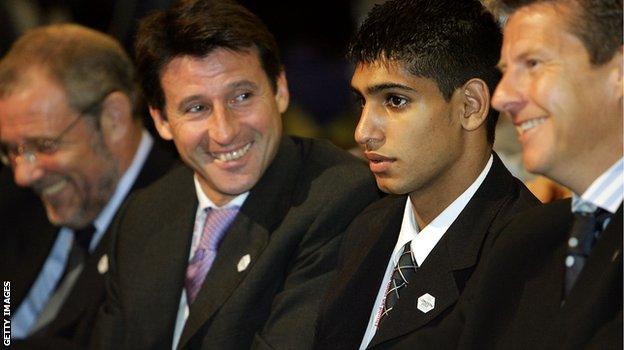
In 2005, Khan helped promote the bid for the London Olympic Games
Those who witnessed that defeat will tell you that those boos were accompanied by shocking racial epithets. It was the same when Khan beat the great Mexican Marco Antonio Barrera two fights later. In 2010, Khan was quoted in The Times as saying that had he been white, he would have been a superstar.
Six years later and six years wiser, Khan claims he didn't mean it how it came out. But he does acknowledge that it has taken plenty of time to be accepted by the British public, and that he is partly to blame for the ambivalence.
"I feel totally different now," says Khan, who is stepping up two weights to challenge Alvarez for the WBC middleweight title in Las Vegas on Saturday.
"It was going to take a little bit of time, what with 9/11, the London bombings and everything that's happening around the world.
"But now I get a lot of love from all over the world, including more from the English people than I ever thought I'd get. I've won an Olympic medal and a world title [in the pro ranks] so they see me as their own.
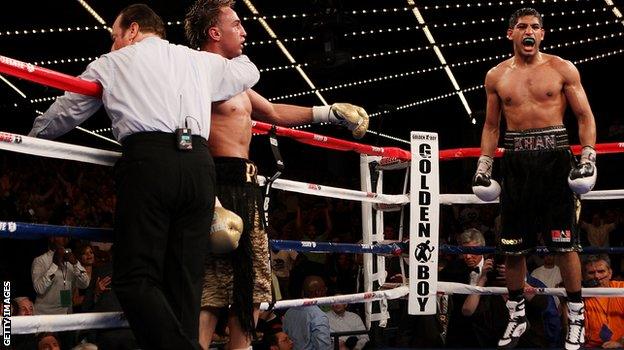
Khan beat Paulie Malignaggi in 2010 in Madison Sq Gardens to retain the WBA light-welterweight title
"And when I was young, I was buying flashy cars and getting into trouble for doing silly things [in 2007 Khan was convicted of careless driving after hitting a man on a pedestrian crossing and in 2008 he was banned for speeding].
"Sometimes when you're a famous name you forget there are millions of people watching. But I'd dreamed of having lots of money, a nice car and a nice watch. It was all new to me and I think it would have happened to anyone."
Khan soon realised that after the fifth or sixth glance of that diamond-encrusted dial on his wrist the happiness those glances initially elicited started to recede. And so he started searching for more lasting forms of happiness elsewhere.
His Amir Khan Foundation has been involved in helping after various disasters across the globe, including the recent floods in Carlisle, earthquake in Pakistan and the 2014 Taliban school massacre in Peshawar, in which 132 children were killed.
"I've got a little girl myself [Khan's wife, Faryal, gave birth to Lamaisah in May 2014], so walking into that school, where just days before innocent kids were being killed, sent shivers down my spine.
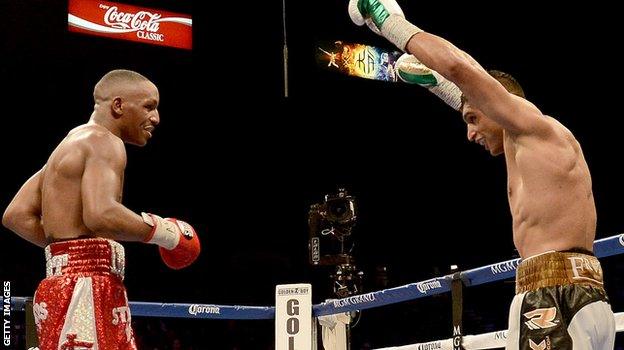
Khan beat Devon Alexander to retain his WBC silverweight title in 2014
"But visiting the injured kids in hospital and seeing the smiles on their faces, because they knew who I was, was something that will stay with me for the rest of my life. I want to be remembered as a people's champion, somebody who helped the community, not just someone who bought nice cars and watches."
While Khan was helping the world and finding himself, his boxing career was drifting. Having won the WBA light-welterweight title in 2009 and then adding the IBF belt in 2011, Khan was outpointed by Lamont Peterson in controversial fashion, before a knockout defeat by Danny Garcia sent him tumbling down the rankings.
Since that defeat by Garcia in July 2012, Khan has fought only five times. Between this sprinkling of fights and his charity work, Khan seemed to be wishing his career away. Potential fights against Floyd Mayweather and Manny Pacquiao proved to be mirages, leaving Khan apparently with one option: a domestic blockbuster against IBF welterweight champion Kell Brook.
When he announced he was fighting Alvarez instead, it left pretty much everyone in the fight game reeling, not least Brook and his promoter Eddie Hearn. The overriding reaction? "Nice work, Amir, albeit utter madness."
More about Amir Khan |
|---|
The man charged with cultivating a plan to upset the odds is Virgil Hunter, who also trains Andre Ward, a contender for the world's best pound-for-pound boxer and one of the most elusive.
"Virgil has totally changed my boxing style," says Khan, who trains out of Hunter's gym in the San Francisco Bay Area of California.
"He's not only taught me new things to do but he's made me understand why I'm doing them. You can't just throw any shot or combination when you want, you have to always remember there might be a punch coming back."
There will be plenty of big punches coming back at Khan on Saturday. And the suspicion is that while Khan will run, one of them will find its target eventually.
"Canelo is a monster, a tough guy, with speed, power, everything. Did I really need to take this fight?" says Khan.
"But only by taking these kinds of fights can I prove to people how good I am and that I belong among the best fighters in history."
A Khan victory would certainly catch the boxing world cold. But as Leicester City proved so wonderfully, phantom punches thrown from unfathomable angles sometimes do the trick.
When 12-year-old Khan met Hatton
- Published4 May 2016
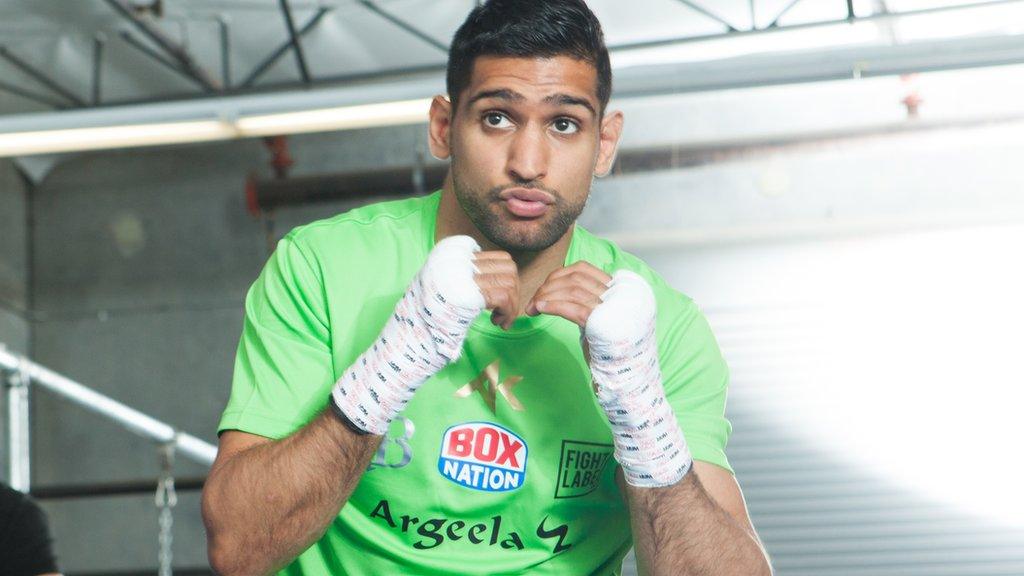
- Published2 May 2016

- Published1 May 2016
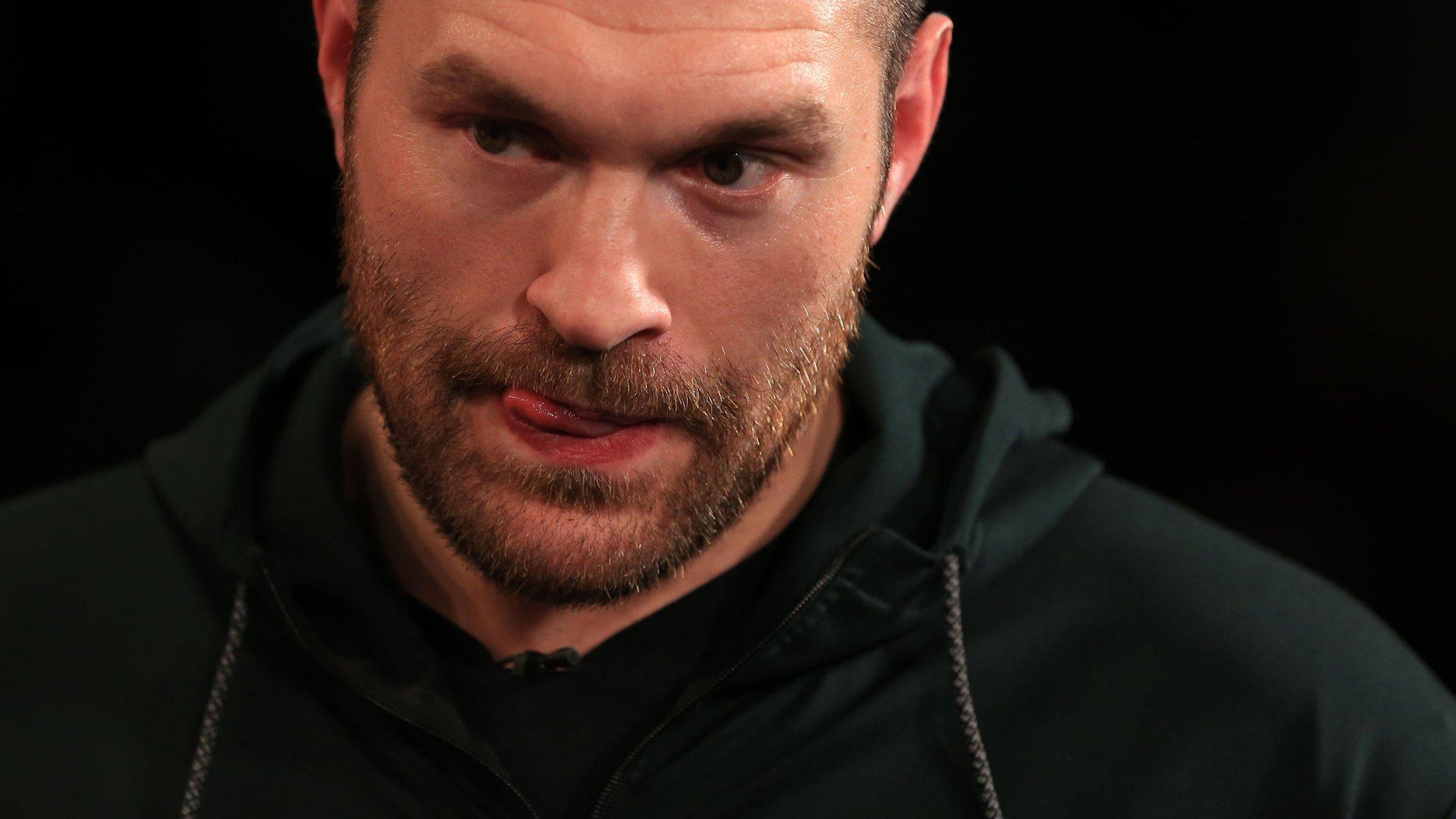
- Published11 June 2018
